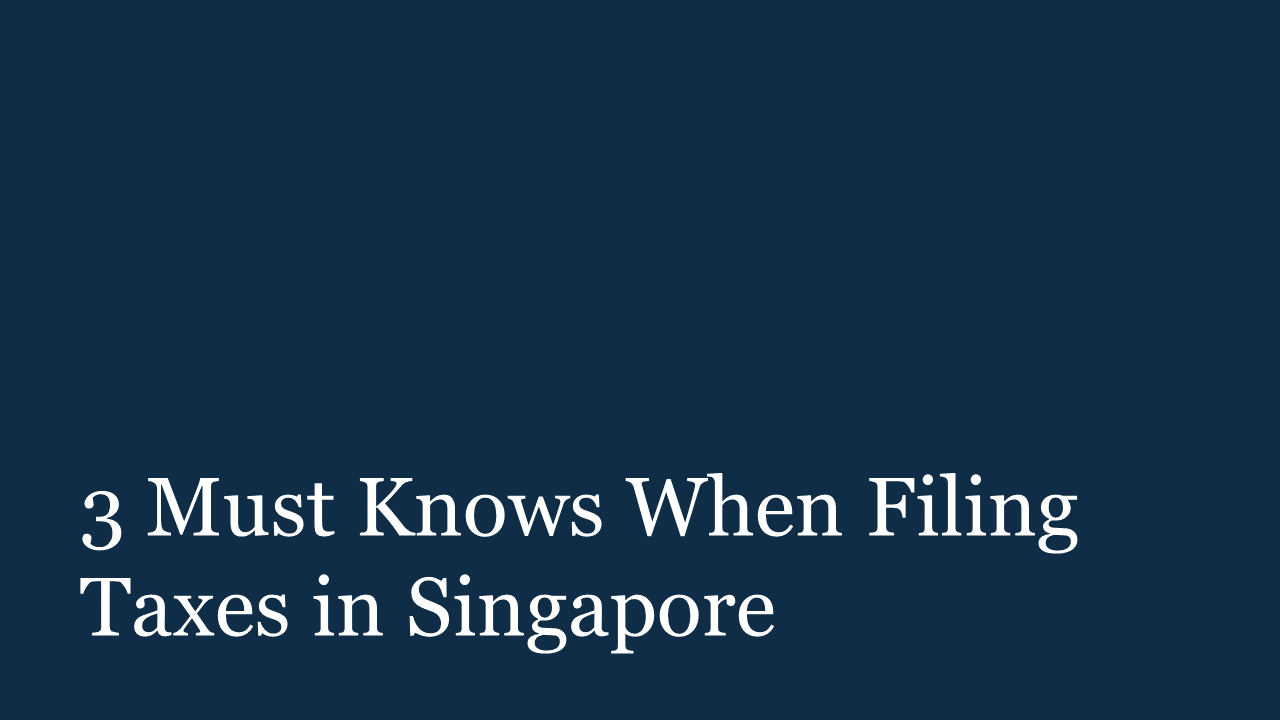3 Must Knows When It Comes to Filing Taxes in Singapore
Mar 14, 2023
It's tax season again! From experience, most employees typically just let companies do the assessments and submit whatever their companies provide. Now if you're single, and only have one source of income (salary), then this is likely enough.
But, when you start to have dependents, hire helpers, and even make contributions for your investments, there are some financial opportunities that open up. That's why in this article, I'll cover the 3 simple must-knows when filing taxes in Singapore.
1. Determine Your Tax Residency Status
First things first, you need to know your tax residency status when filing your taxes in Singapore. This determines how much tax you're required to pay and the tax reliefs you're eligible for.
If you've stayed or worked in Singapore for 183 days or more in a year, you're considered a tax resident. This means you're taxed on your income earned during that year. If you're a non-tax resident, you're only taxed on the income you earned in Singapore.
For example, let's say John is an American who moved to Singapore in July 2021 to work. Since he's only been in Singapore for six months, he's a non-tax resident for the year of assessment 2022. John only needs to declare and pay taxes on the income he earned in Singapore during those six months from July 2021-Dec 2021.
For employees, your company will generally take care of this for you. It is mainly business owners who might have businesses in different countries that need to consider this.
2. Be Aware of Tax Deductions and Reliefs
The Singapore government offers tax deductions and reliefs to help individuals and businesses reduce their taxable income. When you reduce your taxable income, you then reduce your tax payables.
Here are a few examples of tax deductibles:
-
CPF Contributions: Singaporeans and Permanent Residents are required to contribute to the Central Provident Fund (CPF) to save for their retirement. These contributions are tax-deductible up to a certain limit.
-
Supplementary Retirement Scheme (SRS) Contributions: Foreigners, Singaporeans and Permanent Residents can also contribute to the SRS to save for their retirement. These contributions are tax-deductible up to a certain limit.
-
Expenses Incurred in the Production of Income: Expenses incurred in the production of income, such as rental expenses, professional fees, and commission paid to agents, are tax-deductible.
-
Donations: Donations made to approved charities in Singapore are tax-deductible.
-
Parent/Housekeeper Relief: Taxpayers can claim relief if they support their parents or employ a housekeeper.
-
Life Insurance Relief: Taxpayers can claim relief for premiums paid for life insurance policies.
-
Course Fees Relief: Taxpayers can claim relief for the course fees paid for themselves or their children's education.
The IRAS.Gov.sg website has a comprehensive explanation of each of these ones. But overall the most common ones I see clients often claim are: CPF / SRS Contributions, Business Expenses, Donations, and the Helper Levy.
SRS Contributions Can Lead to Lots of Tax Savings!
When it comes to tax deductions, one of the biggest opportunities is really the SRS contributions because it often allows clients to go down a full tax bracket! The potential is so good, so do check it out!
3. File Your Taxes on Time
Lastly, and this really needs to be said. Make sure you file your taxes on time in Singapore. The deadline for individuals to file their taxes is usually April 15 of the following year, while companies' deadlines vary based on their financial year-end.
Failing to file taxes on time can lead to penalties and fines. For example, individuals who don't file on time may be fined up to $1,000, while companies could be fined up to $1,000 for the first offense and up to $2,000 for subsequent offenses.
Plus, if you don't file on time, you might end up waiting longer to receive any tax refunds or payouts you're entitled to.
In summary, filing taxes in Singapore can be complex, but it's crucial to know your tax residency status, keep track of tax deductions and reliefs, and file on time. By following these 3 must-knows, you can ensure that you file your taxes accurately and efficiently and avoid any penalties or fines.
Think You're Paying So Much In Taxes? Let's Talk!
If you're someone who is earning more than $300,000 a year, you can save up to $7,061, just by maximizing your SRS contributions! Whereas someone who is earning $80,000 a year can save $3,219! (This is just one one deductible alone!)
If you'd like to learn more ways to save on taxes, don't hesitate to reach out. We can explore the different ways on how you can save more. Book a 'Maximize Your Wealth Potential' session here!


